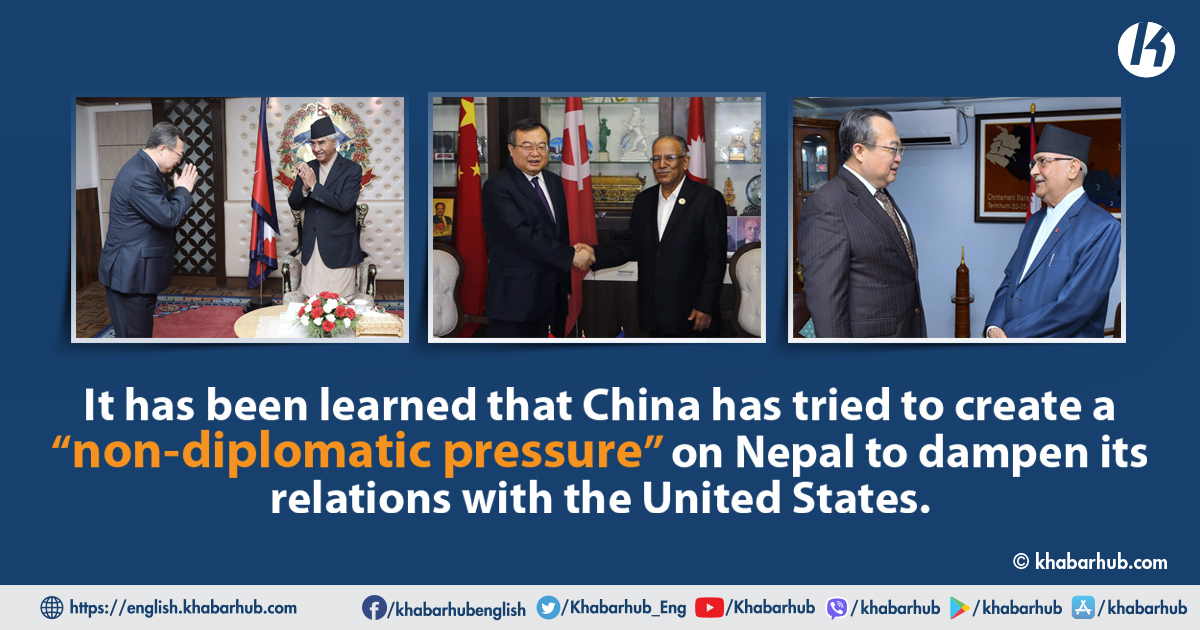KATHMANDU: Chief of the International Relations Department of the Chinese Communist Party (CCP), Liu Jianchao, who is currently in Nepal on a four-day visit, has reportedly lobbied to “discourage and discredit” Nepal-US relations. Instead, it is exerting pressure on Nepali political leaders to “further strengthen” Nepal-China relations.
What does this mean? This means that the agenda of Liu’s visit seems to be to provoke Nepal’s relations with the United States rather than further strengthen Nepal-China relations — a move that is against diplomatic dignity, a Nepali Congress leader, who was present during a dinner meeting with Liu, told Khabarhub insisting anonymity.
During his meeting with Foreign Minister Narayan Khadka, Liu repeatedly showed his interest in the Millennium Challenge Corporation (MCC), State Partnership Program (SPP), and Indo-Pacific Strategy during the meeting held at Hotel Marriott in Kathmandu.
This, according to the NC leader, has a clear indication of how China has been trying to create a “non-diplomatic pressure” on Nepal to dampen its relations with the United States.
Most of the Nepali Congress leaders, who attended the dinner meeting, told Khabarhub that Liu spent most of his time opposing Nepal’s relations with the United States.
Another participant in the meeting, who preferred to remain anonymous, told Khabarhub that Liu asked the leaders why Nepal was bound to endorse the “controversial” MCC.
Some Maoist leaders, who attended the dinner agreed with him, saying that they “hated the United States from the bottom of their hearts”.
He even said China could have provided assistance to Nepal had it asked for the same.
Liu had a flurry of questions, including whether Nepal has participated in the SPP or not? One among them was whether Nepal’s political leaders were aware of the US’ anti-China activities in the region.
He even went on to argue that it would not be in the interest of Nepal and China if Nepal joined the Indo-Pacific Strategy.
“We clarified to him that the MCC was neither an anti-China card nor was aimed at defaming China,” the leader told Khabarhub.
The leaders even told Liu that Nepal would not participate in any military alliance.
NC leaders were “shocked” when Liu, in a soft, yet threatening tone, told them that China, too, would provide assistance and support to Nepal and asked them not to strengthen relations with the United States.
Nepali Congress General Secretary Gagan Thapa, leaders Dr. Shekhar Koirala, Dr. Narayan Khadka, Dina Upadhyay and others repeatedly assured him that Nepal would join the BRI, and accept grants but would not join any military alliance.
“Nepal would do nothing that is detrimental to China,” the leaders assured Liu. However, Liu seemed to be adamant about his stance, the source said.
That’s not all. Liu also reportedly made anti-American arguments at a dinner hosted by the Maoist Center at the Soltee Hotel in his honor.
In the dinner attended by seven Chinese leaders, Maoist Center Chairman Pushpa Kamal Dahal “Prachanda”, leaders Pampha Bhusal, Narayan Kaji Shrestha, Dev Gurung, Krishna Bahadur Mahara, Ram Karki, among others, Liu appreciated Prachanda for “rejecting” the SPP despite the US pressure.
Liu also asked the Maoist leaders to be cautious as the US policy in Indo-Pacific, including the Indo-Pacific Strategy, was basically aimed at surrounding China.
He said that Nepal should not join any military alliance and should be “extremely cautious” while enhancing relations with the United States, a source said.
Some Maoist leaders, who attended the dinner agreed with him, saying that they “hated the United States from the bottom of their hearts”.
Liu said that since the Maoist Center has been a decisive party in taking the key to Nepali politics and power, any anti-China activities and involvement of the US would be stopped.
The Maoist leaders said that they were consistently in favor of greater left unity and that even other leftist parties were prepared to join hands with them.
Meanwhile, during a meeting with Prachanda, Liu raised concerns over the signing of the MCC Compact and raised the issue of SPP and Indo-Pacific Strategy.
Similarly, he also reiterated the same interest in his meeting with CPN-UML Chairman on Tuesday.
According to a recently retired police officer, China was hell-bent on stopping the MCC from being endorsed, and even was planning to incite chaos in Nepal, which was reported by the police to the Prime Minister’s Office.
On the other hand, the government is of the view that China has hands in sponsoring propaganda against the SPP in Nepal.
The government is also investigating how the letter, which the United States did not send, was circulated.
Efforts are being made to find out how an individual, close to China, leaked the documents to two journalists, and an attempt is being made to find the link whether or not the Chinese government was involved in it.
“Initially we weren’t aware of it. But gradually we realized that China was behind the SPP dispute and now we are analyzing the issue,” a minister told Khabarhub.
The minister added that there was no doubt that China instigated the anti-MCC and anti-SPP groups and activities in Nepal.
China had even intensified protests in Nepal to stop Nepal from endorsing the MCC.
According to a recently retired police officer, China was hell-bent on stopping the MCC from being endorsed, and even was planning to incite chaos in Nepal, which was reported by the police to the Prime Minister’s Office.
Nepal Police had also raided some Chinese companies at the time of endorsing the MCC.









Comment